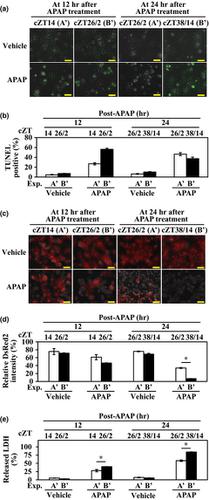当前位置:
X-MOL 学术
›
Genes Cells
›
论文详情
Our official English website, www.x-mol.net, welcomes your
feedback! (Note: you will need to create a separate account there.)
Acetaminophen-induced hepatotoxicity of cultured hepatocytes depends on timing of isolation from light-cycle controlled mice.
Genes to Cells ( IF 1.3 ) Pub Date : 2020-02-27 , DOI: 10.1111/gtc.12755 Koji Moriya 1 , Miho Tamai 1, 2 , Takumi Koga 3 , Toshiaki Tanaka 3 , Yoh-Ichi Tagawa 1, 3
Genes to Cells ( IF 1.3 ) Pub Date : 2020-02-27 , DOI: 10.1111/gtc.12755 Koji Moriya 1 , Miho Tamai 1, 2 , Takumi Koga 3 , Toshiaki Tanaka 3 , Yoh-Ichi Tagawa 1, 3
Affiliation

|
Most physiological changes follow a daily cycle in animals because their circadian rhythm is adjusted to and synchronized with sunlight. In particular, the circadian rhythm affects liver functions, including pharmacokinetics and metabolism. The influence of circadian rhythm has not been included in hepatotoxicity assays used in drug discovery and development. In this study, the contribution of circadian rhythm was investigated in acetaminophen-induced hepatotoxicity in mice and primary cultured hepatocytes. Hepatotoxicity was induced via the intraperitoneal administration of acetaminophen to a greater extent at night than during the day in mice. The sensitivity of acetaminophen-induced hepatotoxicity was consistent with the expression levels of acetaminophen-metabolizing enzyme and circadian genes. The host-derived circadian rhythm was still evident in the primary cultured hepatocytes within a day after their isolation from the liver. Primary cultured hepatocytes isolated at night were significantly more sensitive to acetaminophen than those isolated during the day. The sensitivity toward acetaminophen-induced hepatotoxicity depended on the circadian rhythm of the expression of acetaminophen-metabolizing genes and intracellular glutathione levels in primary cultured hepatocytes. These results obtained from cultured cells correspond to those in mice, suggesting that the timing of hepatocyte isolation is important when investigating drug metabolism and toxicity tests in culture.
中文翻译:

对乙酰氨基酚诱导的培养肝细胞的肝毒性取决于从光周期控制小鼠中分离的时间。
大多数生理变化遵循动物的每日周期,因为它们的昼夜节律被调整为与阳光同步。特别是,昼夜节律会影响肝功能,包括药代动力学和新陈代谢。昼夜节律的影响尚未包括在用于药物发现和开发的肝毒性测定中。在这项研究中,研究了昼夜节律对乙酰氨基酚诱导的小鼠和原代培养肝细胞肝毒性的影响。在小鼠中,晚上对腹膜内给予对乙酰氨基酚引起的肝毒性比白天更大。对乙酰氨基酚引起的肝毒性敏感性与对乙酰氨基酚代谢酶和昼夜节律基因的表达水平一致。从肝脏分离后的一天内,原代培养的肝细胞中仍明显存在宿主衍生的昼夜节律。晚上分离出的原代培养肝细胞对乙酰氨基酚的敏感度明显高于白天分离出的原代培养肝细胞。对乙酰氨基酚引起的肝毒性的敏感性取决于原代培养的肝细胞中乙酰氨基酚代谢基因表达的昼夜节律和细胞内谷胱甘肽水平。从培养细胞获得的这些结果与小鼠的结果相对应,表明在研究培养物中的药物代谢和毒性测试时,分离肝细胞的时机很重要。晚上分离出的原代培养肝细胞对乙酰氨基酚的敏感度明显高于白天分离出的那些。对乙酰氨基酚引起的肝毒性的敏感性取决于原代培养的肝细胞中乙酰氨基酚代谢基因表达的昼夜节律和细胞内谷胱甘肽水平。从培养细胞获得的这些结果与小鼠的结果相对应,表明在研究培养物中的药物代谢和毒性测试时,分离肝细胞的时机很重要。晚上分离出的原代培养肝细胞对乙酰氨基酚的敏感度明显高于白天分离出的那些。对乙酰氨基酚引起的肝毒性的敏感性取决于原代培养的肝细胞中乙酰氨基酚代谢基因表达的昼夜节律和细胞内谷胱甘肽水平。从培养细胞获得的这些结果与小鼠的结果相对应,表明在研究培养物中的药物代谢和毒性测试时,分离肝细胞的时机很重要。
更新日期:2020-02-27
中文翻译:

对乙酰氨基酚诱导的培养肝细胞的肝毒性取决于从光周期控制小鼠中分离的时间。
大多数生理变化遵循动物的每日周期,因为它们的昼夜节律被调整为与阳光同步。特别是,昼夜节律会影响肝功能,包括药代动力学和新陈代谢。昼夜节律的影响尚未包括在用于药物发现和开发的肝毒性测定中。在这项研究中,研究了昼夜节律对乙酰氨基酚诱导的小鼠和原代培养肝细胞肝毒性的影响。在小鼠中,晚上对腹膜内给予对乙酰氨基酚引起的肝毒性比白天更大。对乙酰氨基酚引起的肝毒性敏感性与对乙酰氨基酚代谢酶和昼夜节律基因的表达水平一致。从肝脏分离后的一天内,原代培养的肝细胞中仍明显存在宿主衍生的昼夜节律。晚上分离出的原代培养肝细胞对乙酰氨基酚的敏感度明显高于白天分离出的原代培养肝细胞。对乙酰氨基酚引起的肝毒性的敏感性取决于原代培养的肝细胞中乙酰氨基酚代谢基因表达的昼夜节律和细胞内谷胱甘肽水平。从培养细胞获得的这些结果与小鼠的结果相对应,表明在研究培养物中的药物代谢和毒性测试时,分离肝细胞的时机很重要。晚上分离出的原代培养肝细胞对乙酰氨基酚的敏感度明显高于白天分离出的那些。对乙酰氨基酚引起的肝毒性的敏感性取决于原代培养的肝细胞中乙酰氨基酚代谢基因表达的昼夜节律和细胞内谷胱甘肽水平。从培养细胞获得的这些结果与小鼠的结果相对应,表明在研究培养物中的药物代谢和毒性测试时,分离肝细胞的时机很重要。晚上分离出的原代培养肝细胞对乙酰氨基酚的敏感度明显高于白天分离出的那些。对乙酰氨基酚引起的肝毒性的敏感性取决于原代培养的肝细胞中乙酰氨基酚代谢基因表达的昼夜节律和细胞内谷胱甘肽水平。从培养细胞获得的这些结果与小鼠的结果相对应,表明在研究培养物中的药物代谢和毒性测试时,分离肝细胞的时机很重要。











































 京公网安备 11010802027423号
京公网安备 11010802027423号